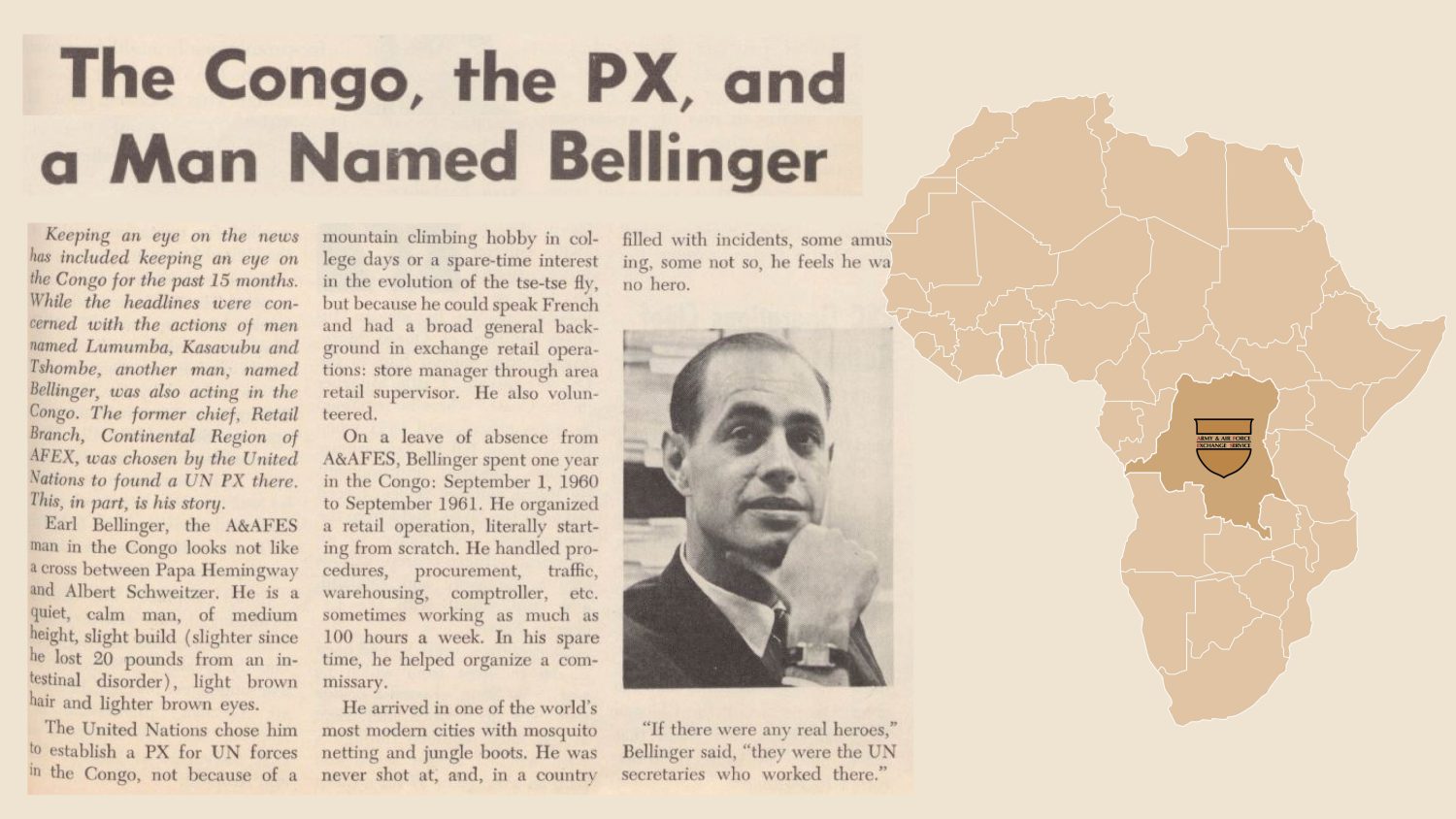#FlashbackFriday: 1960—the Exchange Associate Who Ran a U.N. PX in the Congo

One of the more unusual stories of Exchange support began on Sept. 1, 1960—63 years ago today—when the United Nations established a PX in the Republic of the Congo. An Exchange associate was put in charge—and he would have some stress-inducing adventures that weren’t directly related to running the store.
A couple of months earlier, the country, formerly the Belgian Congo, had gained independence and became the Republic of the Congo. But independence didn’t bring stability. The new country’s president, Joseph Kasavubu, and its prime minister, Patrice Lumumba, were in such conflict that the government couldn’t get much done.
And less than a week after the country gained independence, Congolese soldiers in the Force Publique rebelled against Belgian commanders at Thysville military base, seeking higher pay and more autonomy. The movement spread to other bases, violence erupted across the country, and Europeans (mostly Belgians) fled. Belgium brought in troops to restore order—without checking with the new president or prime minister first.
The Congolese government appealed to the U.N. to provide troops and demanded removal of Belgian troops. On July 13, the U.N. approved a resolution creating an intervention force. The Eisenhower administration supported the U.N. intervention but worried that the crisis would provide an opening for Soviet intervention. Reports of Soviet bloc technicians and materiel were already surfacing.
On Aug. 18, a request came from the Department of State, through the Department of Defense, for an Exchange officer for assignment to the United Nations Emergency Force in the Congo. Earl Bellinger, chief of the Retail Branch, Continental Region of Air Forces Europe Exchange (AFEX), was chosen to staff the PX.
Bellinger was placed on a leave-without-pay status with the Exchange but worked on the U.N. payroll for a year, with the right to return to the Exchange without a loss in pay grade.
Bellinger organized a retail operation in the Congo, overseeing multiple aspects of the operation, sometimes working 100 hours in a week. On top of that, he helped organize a commissary. By December, eight additional AFEX associates, all local nationals, were made available to the U.N.
Instability reach a peak just after Bellinger’s arrival. Kasavubu dismissed Lumumba from the government; the latter ignored him and dismissed Kasavubu. In an attempt to prevent civil war, Congolese National Army Col. Joseph Mobutu staged a coup, ordered all Soviets out of the country and attempted to support a pro-Western government. This all happened in September 1960, and it’s just skimming the surface of the early days of a crisis that lasted until 1965.
During Bellinger’s time in the Congo, pro-Lumumba forces mistook him for a Belgian and held him for three hours before he convinced them that he was American; and he spent a day in jail before he convinced police who’d arrested him at a road block that the “in case of emergency, notify L.T. Bellinger” on his passport was a reference to his father’s initials and not to a lieutenant. Nevertheless, after he came back to the States, he said he missed the Congo. He returned with several souvenirs.
He was modest about his accomplishments. “If there were any real heroes,” he told the Exchange Post, “they were the U.N. secretaries who worked there.”
Bellinger was followed by Louis Weisberg, who had been general manager of the Weisbaden area exchange. His time in the Congo was less eventful than Bellinger’s but he built on what his predecessor had established, overseeing a system of “post exchanges” handled by U.N. troops.
Bellinger died in 2003. According to his obituary, he remained with the Exchange through 1962. He later returned to Africa, joining the Foreign Service and serving in various positions in Burundi, Chad, Tanzania, Nigeria, Germany, France, Egypt and Washington, D.C. In 1983, he was appointed counselor for administrative affairs of the joint administrative services in Brussels, Belgium.
For much more on the Congo Crisis, click here.
Sources: Exchange Post archives; “One Hundred Years of Service: A History of the Army and Air Force Exchange Service; Department of State Office of the Historian; Britannica.com; Lawrence (Kansas) Journal-World

